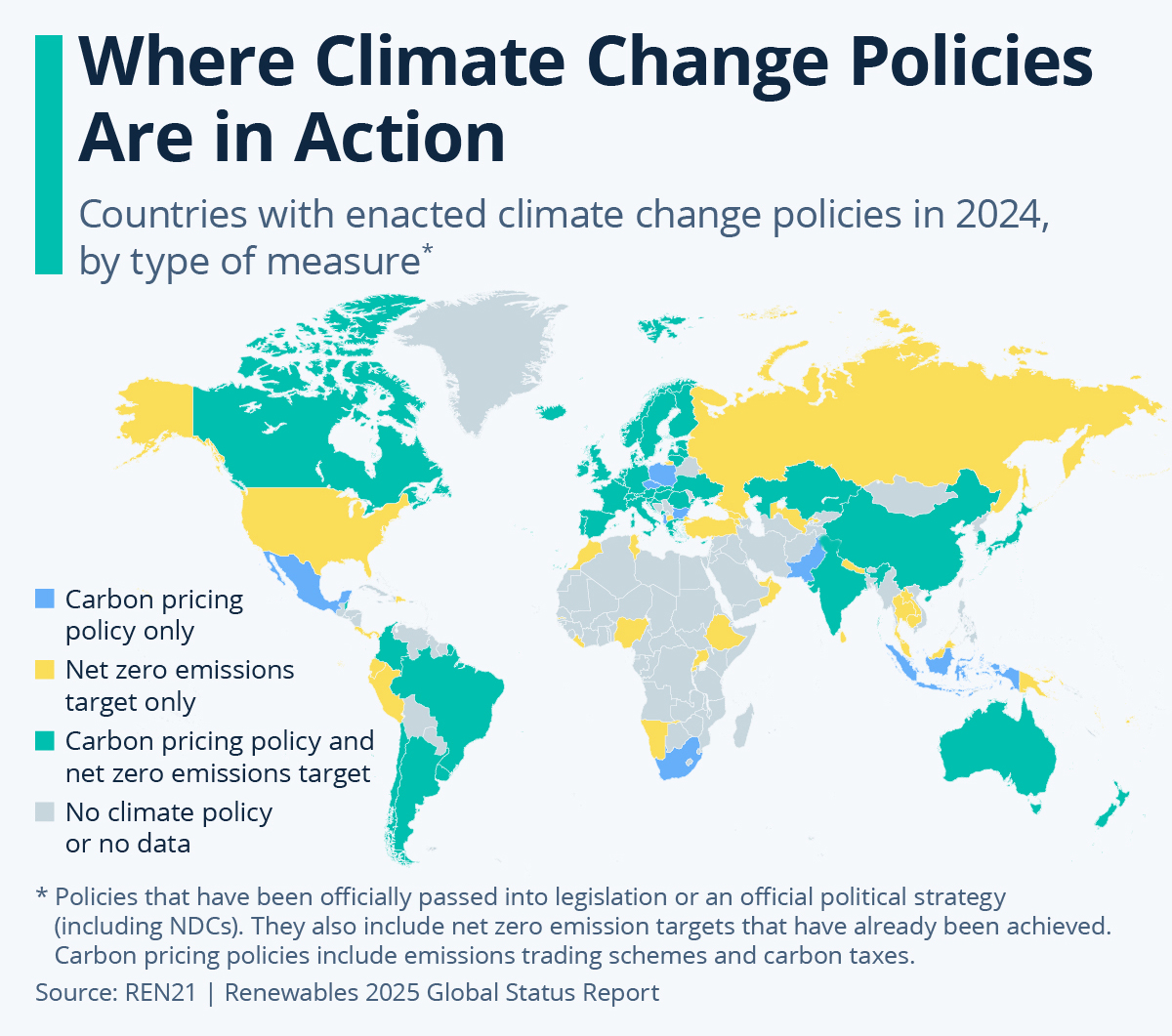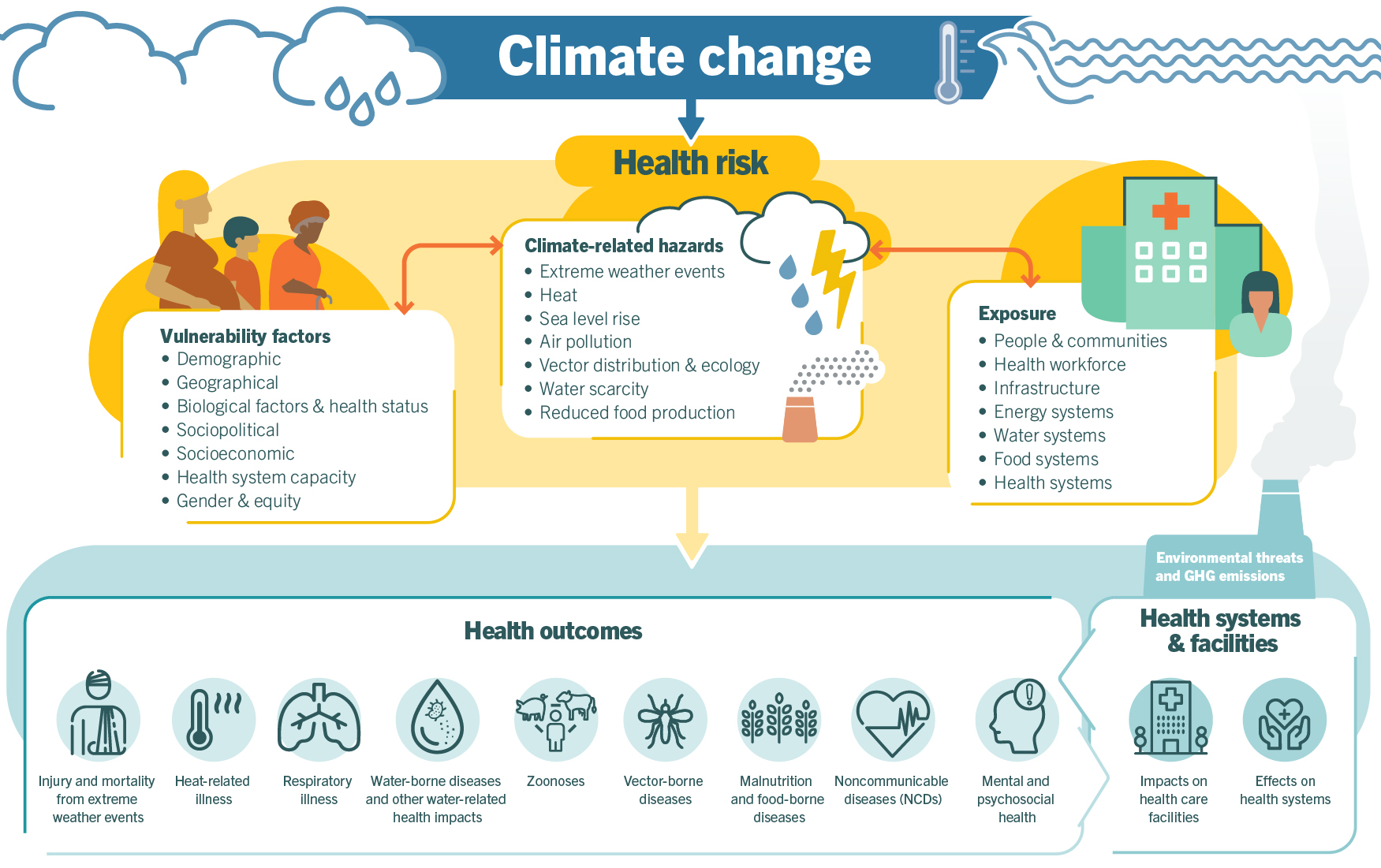Context:
International efforts to tackle climate change are coordinated through the United Nations Framework Convention on Climate Change (UNFCCC). For decades, countries have met every year at the Conference of Parties (COP) to discuss and agree on ways to reduce emissions, build climate resilience, and mobilise finance.
- However, the process has faced a severe credibility crisis in recent years. Many developed nations have not met their climate targets or delivered promised funding to poorer countries. This failure has eroded trust, especially among developing and vulnerable countries that contribute least to emissions but suffer the most from climate impacts.
- The recent withdrawal of the United States from the negotiations after a change in leadership has further weakened confidence in the system. As the world prepares for COP30 in Brazil, there is an urgent need to rebuild faith in the process and agree on reforms that can make climate action more effective and inclusive.
Challenges in Climate Negotiations:
1. Inadequate Climate Finance
- Under the Paris Agreement, developed countries had committed to mobilising at least $100 billion a year to support developing nations’ climate actions.
- Recent assessments show that emerging markets and developing countries (excluding China) require around $2.3–2.5 trillion annually for climate action.
- At COP29, developed countries agreed to raise only $300 billion a year starting from 2035, which falls far short of needs.
- Due to this gap, many developing nations, including India, rejected the proposed climate finance deal.
2. Deadlock on the Mitigation Work Programme (MWP)
- Countries disagree on the future role of fossil fuels.
- Some advocate phasing them out completely, while others see a continued role for fossil fuels, especially in energy security for developing countries.
- This divergence has stalled progress on finalising the MWP.
3. Limited Progress on Climate Targets
- Global greenhouse gas emissions set a new record in 2023, rising by 1.3% over 2022 levels.
- According to the Emissions Gap Report 2024, current pledges and actions are insufficient to meet the 1.5°C goal.
- The world is off track to deliver emission reductions required by 2030.
4. Delayed Implementation of the Loss and Damage Fund (LDF)
- The LDF was established to help vulnerable countries recover from climate disasters.
- Operationalisation has been slow, and funding remains inadequate.
5. Postponement of New Nationally Determined Contributions (NDCs)
- The next round of emission reduction pledges, known as NDCs, has been delayed ahead of COP30.
- This postponement reduces momentum for stronger climate commitments.
6. Disparities in Emissions
- G20 countries account for about 77% of global emissions.
- There are large gaps between countries’ current emissions, historic contributions to climate change, and per capita emissions.
- These disparities make consensus difficult.
7. Alleged Influence of Fossil Fuel Lobbyists
- There have been allegations that fossil fuel companies and polluting industries have undue influence in COP negotiations.
- Their involvement is seen as a reason for watered-down commitments and limited ambition.
Proposals for Reform:
During the recent mid-year climate meeting in Bonn, countries and civil society groups suggested ways to improve the process.
Moderate Reforms Discussed in Bonn
- Streamline agenda items to avoid duplication and save time.
- Limit the length of statements by countries and observer groups.
- Restrict the size of negotiating teams.
- Improve scheduling to allow meaningful participation by smaller delegations.
- These discussions remained inconclusive and will continue at COP30.
Proposals by Civil Society and Advocacy Groups
More than 200 climate groups signed a letter recommending deeper changes:
- Allow majority-based decision-making if consensus cannot be reached.
Currently, every decision requires unanimous consent, which effectively gives each country a veto.
- Prevent countries with poor climate records from hosting COP meetings.
- Reduce the participation of fossil fuel companies in negotiations to avoid conflicts of interest.
- Increase transparency in negotiations to rebuild trust.
However, any reform requires consensus by all parties, making adoption of radical changes unlikely.

Brazil’s Role as COP30 Host
Brazil, as the host of COP30, has shown willingness to lead efforts to reform the process and re-establish credibility.
- Brazil has called for reflection on the future of the UNFCCC process.
- It has highlighted persistent issues such as:
- Overlapping agenda items.
- Barriers preventing small delegations from effective participation.
- Scheduling constraints that limit in-depth negotiations.
- Brazil has proposed:
- Mainstreaming climate discussions across other multilateral forums and UN agencies.
- Creating complementary mechanisms to accelerate implementation of climate decisions.
- Working with countries on 30 priority items to accelerate action.
The success of COP30 will largely depend on whether Brazil can restore faith among developing nations and ensure outcomes that are seen as fair and ambitious.
The Demands of Developing Countries
Developing nations have repeatedly emphasised that without adequate finance and technology support, ambitious climate action is impossible.
- BRICS countries issued a declaration demanding:
- Developed countries fulfil their finance commitments under the UNFCCC and Paris Agreement.
- Increased funding for adaptation measures to protect vulnerable communities.
- Developing countries successfully pressed for a special meeting on finance in Bonn, though it ended without agreement.
- The issue of climate finance will dominate discussions in Brazil.
Way Forward:
To address the credibility crisis and ensure effective climate action, several steps are necessary:
1. Enhance Climate Diplomacy
o Regular and constructive dialogue is essential to bridge gaps between developed and developing countries.
2. Operationalise the Loss and Damage Fund Promptly
o Fast-tracking funding and support will help vulnerable nations recover from climate impacts.
3. Reaffirm the Principle of CBDR-RC
o Common but Differentiated Responsibilities and Respective Capabilities (CBDR-RC) should guide negotiations.
o Developed nations, with their historic emissions, must support developing countries.
4. Strengthen and Enhance NDCs
o Emission reductions of 42% by 2030 and 57% by 2035 are needed to keep warming below 1.5°C.
o Countries must submit updated, ambitious NDCs without further delays.
5. Improve Accountability
o Strengthen reporting mechanisms under the Enhanced Transparency Framework to track progress.
o Create mechanisms to hold countries accountable for commitments.
6. Reduce Influence of Fossil Fuel Interests
o Set clear rules to limit the role of industries that could undermine climate goals.
Conclusion:
Climate negotiations are at a crossroads. While the Paris Agreement showed what global cooperation can achieve, persistent gaps in finance, ambition, and trust now threaten progress.
The road to COP30 presents an opportunity to rebuild credibility, improve inclusiveness, and accelerate action. Success will depend on whether nations can balance ambition with fairness and deliver commitments that match the urgency of the climate crisis.
The choices made in the coming months will determine whether international climate cooperation remains a meaningful force for change or becomes irrelevant in the face of rising global emissions.
| Main question: “Climate finance remains the single most contentious issue in international climate negotiations.” Critically analyse this statement in the context of recent commitments and demands of developing countries. |








